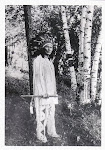Bestselling author Louise Erdrich recently launched Dartmouth’s graduating seniors into the world with an 11 ½ minute, story-filled speech that included chickens, onions, and pong. She described herself as “a member of the class of 1976, the first class that included women, the first class in the newly recommitted Native American Program”(for the full speech, visit the YouTube presentation and the Dartmouth site ).
When Ohiyesa, Charles Alexander Eastman entered Dartmouth in 1882, he, too, was the first (and only member) of a recommitted American Indian program. He, too, was a believer in the power of stories, both individual and community, and became a bestselling American author. As Erdrich learned Ojibwe as a second language, Ohiyesa learned English, but he continued to speak, read, and write in his first tongue, Dakota. Hanging on to his first language enriched his life and the nation, for with it, he collected stories and histories others could not.
No summary could do justice to the humility, humor, practical advice, and ardency in Erdrich’s speech, so you just have to listen to it or read it. Eastman was known for similar qualities and it is unfortunate that we have no YouTube presentations of him. His speeches resonated with similar pleas (though different stories, of course). When asked to participate in the first Universal Races Conference in London in 1911, he advocated respect and peace between races, cultures, and religions. He himself straddled and held on to principles of his Dakota spirituality and of Christianity. When conflict arose over religion between participants of the Races Congress about resolution wordings, he stood up:
“While I am myself a believer in the simple principles of Christianity, we who are met here are not all of that religion, and I would suggest that we substitute a term to which we can all subscribe . . . . universal brotherhood.”
Finally, Erdrich made no bones (well, actually she did mention skeletons) about how the planet needs each graduate’s talents and passions:
“Have you ever been in a relationship where you took someone for granted, where you treated that person badly but he or she seemed resilient? A relationship in which you had the feeling that things were going to be all right in spite of how you’d acted and then, boom, all of a sudden you got dumped?
“That is the relationship we are in right now with the earth. But if the earth dumps us, we actually do die of broken hearts. We get extirpated, ended, exterminated, finished. The numbers are crunched; the science is done. Our planet, which at best estimate might support 2 billion modest lifestyles, will see our population jump to 7 billion in just two years. We’re in a nosedive unless we can change as a species. . . . So don’t hold back, don’t punt. DO WHAT YOU LOVE BEST. Make your life doing what you love best, but do is as if it meant you were out to save the world. Because you are.”
In Eastman’s time, long before “green” or environmentalism,” the country was already suffering from pollution and watching species going extinct. He wrote in “Of Life and Art,” in the Society of American Indian's American Indian Magazine:
“I once showed a party of Sioux chiefs the sights of Washington, and endeavored to impress them with the wonderful achievements of civilization. . . ‘Ah!’ exclaimed an old man, ‘such is the strange philosophy of the white man! He hews down the forest that has stood for centuries in its pride and grandeur, tears up the bosom of Mother Earth, and causes the silvery water-courses to waste away and vanish. He ruthlessly disfigures God’s own pictures and monuments, and then daubs a flat surface with many colors and praises his work as masterpieces!’”
Ohiyesa means the "One Who Continually Wins" -- a name he lived out through perseverance, often facing failure and humiliation. Erdrich urged all to risk failing until they triumph because we, as a species, cannot survive if we give up.
Erdrich and Eastman are separated by divergent backgrounds and ninety years between their graduation dates, but they are connected by more than just their Dartmouth educations and Native American heritages. Erdrich co-wrote an introduction to a reprint of Eastman’s Wigwam Evenings, and if he could, as he did when he was alive, he would echo Erdrich's admonitions to couple knowledge with compassion and love:
“We must stop fighting endless wars and act to heal and love this world. Nindiniwemaganidok. You are my relatives. We are all related through our common humanity and through this college and all who endeavor, here, as one, to make this the best world possible.”
He would have put it this way: Mitakuye Owasin, We are all related.
Sunday, July 26, 2009
Subscribe to:
Post Comments (Atom)





No comments:
Post a Comment